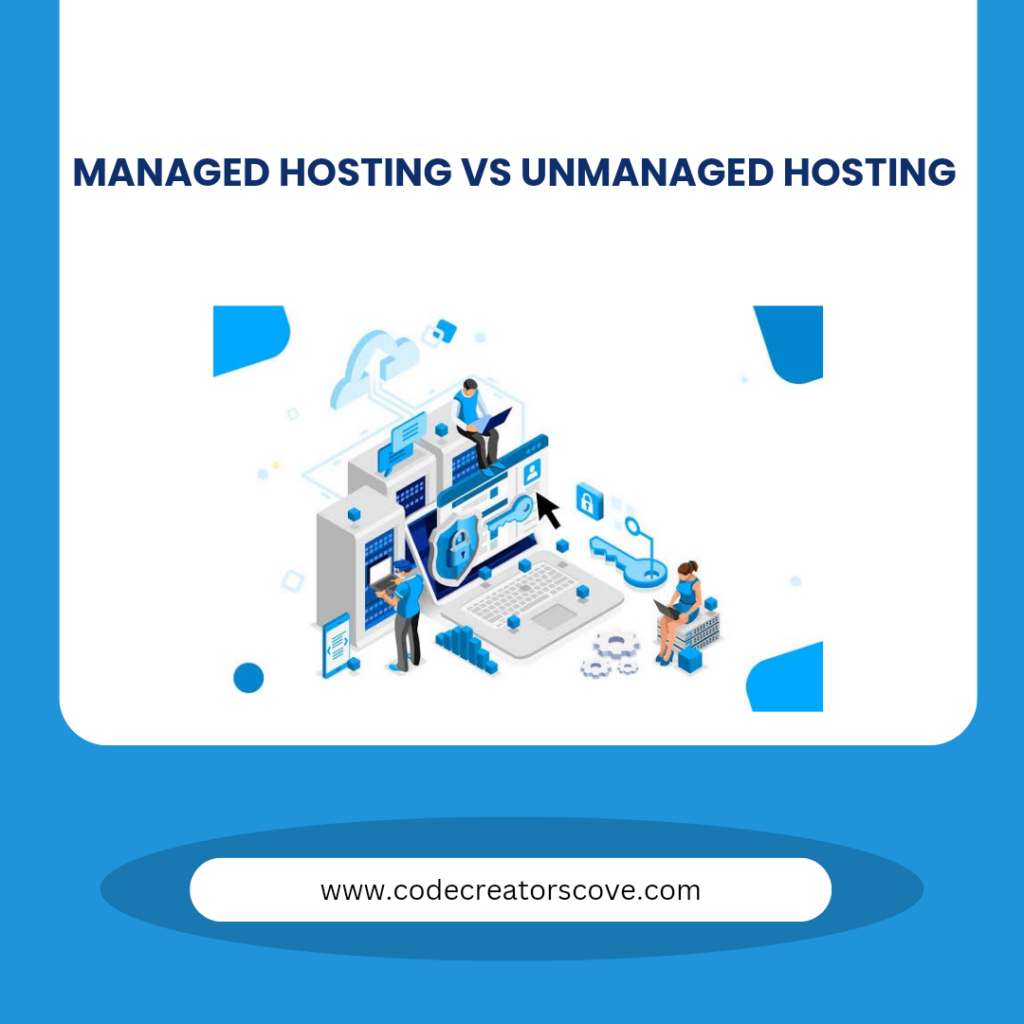In today’s digital landscape, selecting the appropriate hosting solution is pivotal for the success and efficiency of your online presence. Among the myriad of options available, managed hosting and unmanaged hosting stand out as two primary choices, each tailored to different needs and levels of expertise. This comprehensive guide will explore the essential differences between these two types of hosting, helping you make an informed decision based on your specific requirements.
What is Managed Hosting?
Managed hosting is a service where the hosting provider takes full responsibility for the day-to-day management of your server. This includes a wide range of tasks such as maintenance, security, backups, and updates. Managed hosting is ideal for individuals or businesses that prefer to focus on their core activities without worrying about the technical aspects of server management.
Benefits of Managed Hosting
1. Expert Support: Managed hosting provides access to a team of experienced professionals who handle all server management tasks. This support encompasses troubleshooting, performance optimization, and continuous security monitoring. When issues arise, you have experts ready to assist, reducing downtime and ensuring smooth operations.
2. Enhanced Security: Security is a top priority with managed hosting. Providers implement robust security measures, including firewalls, malware scanning, intrusion detection systems, and regular security audits. They also perform timely software updates and patches to safeguard your website from vulnerabilities and cyber threats.
3. Regular Backups: Managed hosting services typically include automated backups. This ensures that your data is regularly saved and can be restored in case of data loss or a catastrophic event. The peace of mind that comes from knowing your data is secure and retrievable is invaluable.
4. Expandability: As your business grows, your hosting needs will evolve. Managed hosting solutions offer seamless scalability options, allowing you to easily upgrade your resources to handle increased traffic and data. This flexibility ensures that your website continues to perform optimally even as demand grows.
5. Time-Saving: By entrusting server management to professionals, you save significant time. This allows you to focus on other critical aspects of your business, such as content creation, marketing, and customer engagement. The time saved on technical tasks can translate into greater productivity and growth for your business.
What is Unmanaged Hosting?
Unmanaged hosting, on the other hand, provides you with a server and basic support, leaving the majority of management tasks up to you. This includes server setup, maintenance, security, and troubleshooting. Unmanaged hosting is suitable for individuals or organizations with technical expertise or those who desire complete control over their server environment.
Benefits of Unmanaged Hosting
1. Cost-Effective: Unmanaged hosting is generally less expensive than managed hosting since you are not paying for additional management services. This makes it an attractive option for startups and small businesses operating on a tight budget.
2. Full Control: With unmanaged hosting, you have complete control over your server. This means you can configure it to meet your specific requirements and preferences. You have the freedom to install and run any software or applications you need without restrictions.
3. Flexibility: Unmanaged hosting offers greater flexibility in terms of software and application installation. You are not limited by the hosting provider’s policies and can customize your server environment to suit your exact needs. This flexibility is particularly valuable for developers and businesses with unique hosting requirements.
4. Learning Opportunity: Managing your own server can be a valuable learning experience. It allows you to enhance your technical skills and gain a deeper understanding of server operations. This knowledge can be beneficial in various aspects of your business, from troubleshooting to optimizing performance.
Key Differences Between Managed and Unmanaged Hosting
Understanding the primary differences between managed and unmanaged hosting can help you choose the right solution for your needs.
1.Management and Support
– Managed Hosting: The hosting provider handles all aspects of server management, offering comprehensive support and proactive maintenance. This includes software updates, security measures, performance optimization, and troubleshooting.
– Unmanaged Hosting: You are responsible for managing the server. The hosting provider offers minimal support, typically limited to hardware-related issues. You need to handle software updates, security, and maintenance tasks on your own.
2. Security
– Managed Hosting: Providers implement advanced security measures to protect your website. This includes firewalls, malware scans, regular updates, and continuous monitoring for threats. Managed hosting significantly reduces the risk of security breaches.
– Unmanaged Hosting: Security is your responsibility. You need to ensure your server is secure by implementing firewalls, performing regular updates, and monitoring for potential vulnerabilities. This requires a good understanding of security practices and protocols.
3. Cost
– Managed Hosting: Typically, managed hosting is more expensive due to the additional management services provided. The cost reflects the convenience and peace of mind that comes from having experts handle your server.
– Unmanaged Hosting: Unmanaged hosting is more cost-effective as you are only paying for the server and basic support. The lower cost makes it a viable option for those with the necessary technical skills to manage their server.
4. Control and Flexibility
– Managed Hosting: Control over server configurations is limited, as the provider manages most aspects. While this can be seen as a drawback for some, it ensures that best practices are followed, and the server is optimized for performance and security.
– Unmanaged Hosting: You have full control over server settings and configurations, allowing for extensive customization. This flexibility is ideal for those with specific technical requirements or those who need to run specialized software.
5. Technical Expertise
– Managed Hosting: Requires minimal technical knowledge. The provider handles complex tasks, making it an excellent choice for those who lack technical expertise or prefer to avoid server management.
– Unmanaged Hosting: Requires significant technical expertise to manage and maintain the server effectively. This includes knowledge of server configurations, security practices, and troubleshooting techniques.
Which Hosting is Right for You?
Deciding between managed and unmanaged hosting depends on several factors, including your technical expertise, budget, and business needs.
Choose Managed Hosting If:
– You prefer to focus on your business rather than server management.
– You lack the technical skills required for server maintenance and security.
– You want enhanced security and regular backups managed by professionals.
– You can allocate a higher budget for hosting services, valuing the convenience and support provided.
Choose Unmanaged Hosting If:
– You have the technical knowledge to manage and secure a server.
– You seek complete control over your server environment and configurations.
– You are operating on a tight budget and can handle server management tasks yourself.
– You enjoy the challenge of managing your own server and see it as an opportunity to enhance your technical skills.
Conclusion
Both managed and unmanaged hosting have distinct advantages, catering to different types of users and needs. Managed hosting provides peace of mind with expert support, robust security, and time-saving benefits, making it ideal for businesses that want to offload technical responsibilities. Unmanaged hosting, however, offers greater control, flexibility, and cost savings for those with the necessary technical skills.
By understanding the key differences between these two hosting options, you can choose the one that aligns best with your needs. Whether you opt for the convenience and support of managed hosting or the control and cost-effectiveness of unmanaged hosting, the right choice will ultimately depend on your specific requirements and resources. With the right hosting solution, you can ensure a smooth and successful online presence, tailored to your business’s unique demands.


